By Jack Brammer
NKyTribune reporter
John Y. Brown Jr., who turned Kentucky Fried Chicken into a multimillion-dollar global enterprise before trying to run the state like a business as its Democratic governor from 1979 to 1983, has died. He was 88.
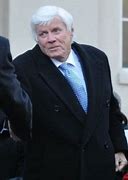
John Y. Brown Jr.
Brown’s five children confirmed his death on Tuesday.
Brown had three children with his first wife, Eleanor Durall: former Kentucky Secretary of State John Y. Brown III, Eleanor Faris, and Sandra Bennett. With his second wife, former CBS sportscaster and Miss America Phyllis George, who died in May 2020, Brown had two children: CNN anchor Pamela Ashley Brown and businessman Lincoln Tyler George Brown.
Brown’s family said, “Our dad, John Y. Brown Jr., not only dreamed the impossible dream, he lived it until the very end.
“His positive attitude and zest for life were unrivaled and allowed him to beat the odds many times over. Every day was an exciting adventure for him. He was a true Kentucky original who beamed with pride for his home state and its people. He had many prominent accomplishments, but most of all he loved his family with all of his heart, and we in turn loved him with all of our hearts.
“We are heartbroken by his passing, but find comfort in what he wrote in one of his final days, “I have never been so happy.”
Kentucky Gov. Andy Beshear said in a statement, “I am sad to share that former Gov. John Y. Brown Jr. passed away yesterday.
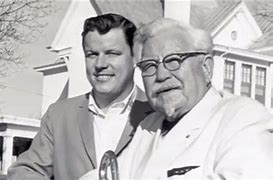
John Y. Brown and Col. Harlan Sanders
“Gov. Brown was a remarkable leader who was committed to serving the people of Kentucky. He made our commonwealth a better place. Britainy and I are praying for his family and loved ones.”
Beshear directed that flags at all state office buildings be lowered to half-staff in Brown’s honor until sunset on the day of interment.
The former governor will lie in state in the rotunda of the Kentucky State Capitol, said Beshear. Visitation will be Tuesday, Nov. 29, 10 a.m.-7 p.m. The Brown family will host a public visitation in the Rotunda from 3-7 p.m. A private memorial service will held at the State Capitol building on Wednesday. The public can view the service on Kentucky Educational Television at ket.org.
U.S. Senate Minority Leader Mitch McConnell, R-Louisville, said he and his wife, Elaine, were saddened to hear about Brown’s death.
“Many of us first learned of Gov. Brown through his business leadership,” said McConnell.
“As one of the chief investors to purchase Kentucky Fried Chicken from Harland Sanders in 1964, he took one of the commonwealth’s signature businesses and made it a global household name.
“Later in life, he applied his private sector prowess to government, promising to run Kentucky with the same discipline and creativity that had made his various enterprises thrive. Our prayers are with Gov. Brown’s children and all others who knew and loved this legendary businessman and statesman.”
Early years and money in fried chicken
Brown was born into politics on Dec. 28, 1933, in Lexington to John Y. and Dorothy Inman Brown. His father was a member of the U.S. House of Representatives from Kentucky and a member of the state legislature for nearly 30 years, including a term as House speaker.
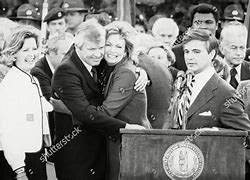
John Y. Brown and Phyllis George Brown, 1979, victorious in the gubernatorial election.
At Lafayette High School in Lexington, Brown lettered in several sports. During the summer, he sold vacuum cleaners, making about $1,000 a month in commissions. He earned a bachelor’s degree in 1957 and a law degree in 1960 from the University of Kentucky. While in law school, he made as much as $25,000 a year selling Encyclopedia Britannica sets.
He initially practiced law with his father and served in the U.S. Army Reserves from 1959 to 1965.
In 1964, Brown purchased Kentucky Fried Chicken from founder Harland Sanders. He parlayed it into an international restaurant chain.
Seven years later, he sold his interest in the business to Heublein for $284 million and invested in several other restaurant ventures. None reached the status of KFC.
In the 1970s, Brown invested in three professional basketball teams: the American Association’s Kentucky Colonels and the National Basketball Association’s Boston Celtics and Buffalo Braves (now the Los Angeles Clippers).
The political arena
In 1979, Brown, who always loved a challenge, decided to run for governor of Kentucky. His campaign slogan during hard economic times was to run state government like a business.
That slogan, with the celebrity status of his new wife, Phyllis George, propelled Brown into the governor’s office. He defeated former Republican Gov. Louie B. Nunn in the general election.
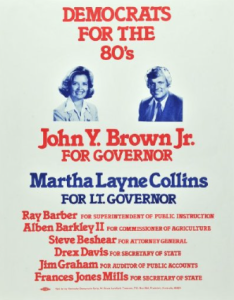
To emphasize his campaign slogan, Brown filed his key appointments with successful businesspeople. He also brought diversity to state government, placing a woman and an African-American in his cabinet.
During his tenure, the legislature gained more independence from the governor’s office. Brown also put more attention on economic development. He helped start the AA Highway in Northern and northeastern Kentucky. He and his wife renovated the Governor’s Mansion with public support and emphasized the state’s arts and crafts.
After he left the governor’s office, Brown ran for the U.S. Senate in 1984 but withdrew from the race, citing health issues. He continued to invest, marking another success in Kenny Rogers Roasters, a chicken restaurant, with the country music singer.
In 1987, Brown tried politics again. He entered the Democratic primary for governor. A dispute between Brown and Lt. Gov. Steve Beshear about Brown’s lifestyle and taxes led to a victory by Lexington businessman Wallace Wilkinson.
The Brown administration recorded no public scandals but there were personal scandals.
In 1981, Brown was investigated from withdrawing $1.3 million from a Miami bank. It failed to report the transaction to the IRS as required by law. The FBI investigated and Brown claimed he withdrew the money to pay for “one bad night gambling” in Las Vegas. He later took back that statement and was never charged with any wrongdoing.

John Y Brown Jr., when he was inducted into the Kentucky Entrepreneurs Hall of Fame.
Some of Brown’s friends were involved in a cocaine and gun-smuggling ring that was the subject of a 1990 book called “The Bluegrass Conspiracy.” Brown was never accused of any wrongdoing.
In 1998, Brown and Phyllis George divorced. Later that year, he married former Mrs. Kentucky Jill Louise Roach. The marriage lasted less than five years.
Reaction to Brown’s death
Former Gov. Martha Layne Collins was lieutenant governor during Brown’s tenure as governor.
“John Y. approached things differently,” said Collins. “He was a progressive and you never knew what to expect from him. He brought Muhammad Ali to the inauguration and I got to sit by Ali. It was not your usual inauguration or administration.”
Former Gov. Steve Beshear said on his Facebook page, “We have lost one of Kentucky’s most unique and interesting individuals with the passing of Gov. John Y. Brown Jr.
“One of his many talents was great salesmanship, and he made Kentucky’s name known worldwide when he developed Kentucky Fried Chicken. He used that same talent to become Kentucky’s 55th governor in 1979. Among his gubernatorial accomplishments was the creation of the Governor’s Scholars Program, which both of our sons, Jeff and Andy, later attended.
“While Gov. Brown and I were political rivals at times, Jane and I developed a warm and personal friendship with John Y. and his family in later years, and we will miss him. Our thoughts go out to all of his family in this difficult time.”
Former Attorney General and House Speaker Greg Stumbo called Brown “a great promoter. He loved to promote the state.”
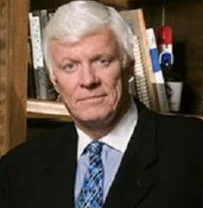
Stumbo said Brown “brought Kentucky into the 21st century with his promotion of economic development throughout the world.
“The tools he put in place have reaped the state much.”
On a personal level, Stumbo said Brown was “very charismatic. He might disagree with you on something but he never got mad.”
Republican Agriculture Commissioner Ryan Quarles, who is running for governor in 2023, said he was “deeply saddened” to learn about Brown’s death.
“A businessman first and a politician second, Brown ran his administration much more like a business, appointing successful businesspeople to state posts instead of political appointments. By doing this he was able to reduce the state’s budget by more than 20 percent and brought commerce to the state during his tenure.
“He also brought diversity into state posts, serving alongside the first female lieutenant governor and naming a woman and an African-American to his cabinet. His time in office was much to be admired. I pray his family and friends find peace during this difficult time.”
Ferrell Wellman, a former TV reporter for WAVE in Louisville, covered the entire Brown administration.
He said the main characteristic of the Brown administration was that it was run by business people, not politicians.
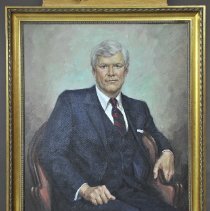
Governor’s portrait
The preceding administration, that of Democratic Gov. Julian Carroll, “had been troubled by accusations of political corruption and in comes this fresh face with a new team.
“The idea was to run government like a business but, really, the measuring sticks are not the same. Government is a service agency, not a profit venue,” said Wellman.
Unlike other governors who relished in controlling the legislature, Brown backed off, said Wellman. “This was a dramatic change in state government.”
Governing in difficult economic times and refusing to raise taxes forced Brown to lay off many state workers, said Wellman. “There is still resentment to this day about that.”
Overall, Brown was “an unorthodox governor who was very fun to cover,” said Wellman. “We saw him drive a motorcycle from his Cave Hill home in Lexington to the Capitol. He didn’t maintain regular office hours but worked when he had to work.
“He was extremely friendly and was considerate to the media. He liked to have a good time and wanted others to have a good time. He was a most positive person who really was low maintenance and found unique ways to handle problems.”
For example, Wellman said, Brown had encouraged the University of Kentucky and University of Louisville to start playing each other in basketball during the regular seasons.
When that big game materialized, people were wondering which side he would sit on.
Brown had a coin flipped to determine where he would sit the first half. He went to the other side for the second half, decked out in a specially made blazer that was half blue for UK and half red for U of L.



















